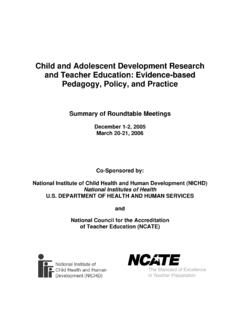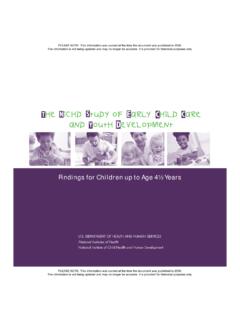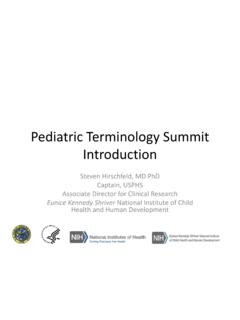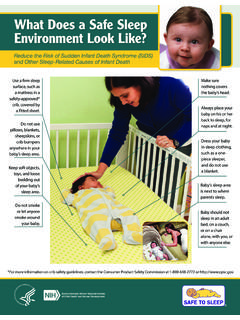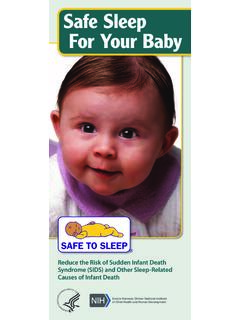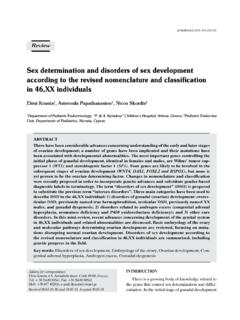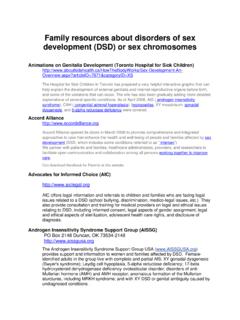Transcription of Developmental Focus on Disorders of Sex Development ...
1 Freund LS et al. Developmental Focus on DSD .. Horm Metab Res 2015; 47: 309 311 Editorial Developmental Focus on Disorders of Sex Development : Special Issue Overview 309 Authors L. S. Freund, S. Taymans, E. Wehr, C. A. Stratakis Eunice Kennedy Shriver National Institute of Child Health and Human Development , National Institutes of Health, Bethesda, USA Key words Disorders of sex Development (DSD) gender Development psychosocial Development clinical management received accepted Bibliography DOI Horm Metab Res 2015; 47: 309 311 Georg Thieme Verlag KG Stuttgart New York ISSN 0018-5043 Correspondence L. S. Freund Child Development and Behavior Branch Eunice Kennedy Shriver National Institute of Child Health and Human Development (NICHD) 6100 Executive Blvd., Room 4B05H Bethesda MD 20892 USA Tel.
2 : + 1/301/435 6879 Fax: + 1/301/480 2080 Disorders of Sex Development (DSD) a broad array of conditions of differing etiologies in which the Development of chromosomal, gonadal, or phenotypic sex is atypical, including the con-dition of ambiguous genitalia has only recently been part of the clinical nomenclature [1]. It is still not considered ideal terminology by those affected by DSD nor do all clinicians or research-ers agree that it is the best term to use for the wide range of conditions that fall under this diag-nostic category. The data on the incidence of DSD are sparse, but it is estimated that the prevalence is one in 4500 5000 in the general population or even higher, if one includes subtle hormonal changes that affect gonadal function [2]. There have been advances in our understanding of the pathophysiology of these Disorders , but we still lack an evidence base of 1) short and long-term outcomes from newer surgical techniques, 2) the efficient use of available genetic and molecular diagnostic tools, and 3) optimal treatment with exogenous hormones.
3 Equally important is the need to expand our understanding of the devel-opmental implications of DSD for the child and the impacts on the family of children with DSD. We know very little about the impact of DSD during different periods of Development on the affected child and on the child s family, which can have important implications for the timing and nature of clinical interventions as well as the overall health and wellbeing of children and fam-ilies affected by DSD. To date, the literature on DSD has focused largely on endocrinology, urology, and genetics. To the limited extent that the field has addressed child and adolescent Development , it has focused almost exclusively on individual psychosexual outcomes [3]. To stimulate research on develop-mental dimensions in DSD care, the Eunice Ken nedy Shriver National Institute of Child Health and Human Development (NICHD), with addi-tional support from the Office of Research on Rare Diseases of the National Institute of Health s National Center for Advancing Translational Sci-ences, convened a scientific workshop: Growing up with DSD: Critical Developmental Issues for Children and Families Affected by Disorders of Sex Development , on March 26 27, 2014, in Bethesda, Maryland, USA [4].
4 Experts from a wide range of disciplines were invited and repre-sentation from an umbrella group of advocacy organizations was included to spark discussion and inform NICHD about research priorities in the area of DSD. The workshop included sessions on diagnostic factors associated with quality of life outcomes for patients at different develop-mental stages, decision-making in the context of gender assignment or other DSD treatments, the psychosocial aspects of living with DSD, clinical management and social factors associated with quality of life outcomes, and examples of research with other typical and atypical Developmental conditions, that can inform research and clinical management of DSD. It is from this workshop that this special issue in Hormone and Metabolic Research was conceived. The articles included in this special issue corre-spond to several of the presentations made at the March 2014 NICHD workshop.
5 Article topics fall within several broad categories related to devel-opment and DSD including, current biomedical techniques, the interface between affected child and family and the medical community, the psy-chosocial and gender Development issues for children and adolescents with DSD and their families, and clinical research approaches with a Developmental Focus . The special issue ends with an assessment of how the field has progressed since the 2006 Chicago DSD Consensus [2]. The series of article starts with recent advances in chromosomal microarray and exome sequenc-ing technologies for diagnosing DSD that are reviewed by Hayk Barseghyan, Emmanu le D lot, and Eric Vilain [5]. These techniques have allowed Affiliation Freund LS et al. Developmental Focus on DSD .. Horm Metab Res 2015; 47: 309 311 Editorial310 for greater efficiency and higher rates of successful diagnosis of DSD.
6 The authors propose a new model for clinical diagnosis of DSD using exome sequencing as a first-stage diagnostic tech-nique. Michael DiSandro, Richard Rink, and Deborah Merke [6] describe current surgical techniques and medical management of DSD. The authors consider these newer approaches within a Developmental perspective and point out that there is little evi-dence to either support early surgery to normalize atypical genital appearance or to delay such surgery. Jennifer Dietrich [7] reviews the variable presentation of congenital reproductive tract anomalies that raise surgical, gynecologic and obstetric concerns and that, in some cases, may co-occur with renal, spi-nal or other malformations that must be evaluated simultane-ously. She notes the lack of consensus about treatment of different congenital reproductive tract anomalies and the need for data on short- and long-term outcomes.
7 An important aspect of what was discussed at the meeting was the interface between affected child and family and the medical community: It is difficult to imagine the weight of responsibility for parents in deciding gender assignment and considering geni-toplasty for a child born with DSD. Laura Siminoff and David Sandberg [8] review the complementary roles of shared deci-sion-making, decision aids and support tools (DASTs) in assist-ing health care providers and caregivers in considering clinical options when a child with DSD is born. The authors are currently developing such a tool with support from the Patient-Centered Outcomes Research Institute [9]. Alexander Kon [10] examines ethical principles related to early gender assignment and genito-plasty for infants with DSD. He suggests that early interventions may not be in a child s best interest, given reports from adults with DSD of adverse outcomes of earlier surgery techniques as well as later gender identification that differs from that assigned earlier in Development .
8 In addition, he discusses an ethical obli-gation to safeguard a child s right to an open future. The article by Amy Lossie and Janet Green [11] is written from the viewpoint of DSD patient advocate priorities. They describe the role of activism in moving the medical community from a DSD standard of care based on early patient fixes and non-disclosure of medical information to patients, to the 2006 DSD consensus statement, which emphasizes multi-disciplinary care, questions evidence for many standard procedures, and pro-motes the inclusion of fully informed patients in their own med-ical decision-making. Lossie and Green further identify multiple challenges to be met in developing the capacity of affected indi-viduals and families, researchers and clinicians to work together collaboratively to improve care for DSD. Psychosocial and gender Development issues for children and adolescents with DSD and their families are reported by Anna Nordstrom [12] who reviews literature on quality of life (QoL) and psychosocial outcomes in DSD.
9 Follow-up studies have often focused on surgical results, sexual function and psychosexual outcome and indicated unsatisfactory results in many cases, while epidemiological studies indicate that for some diagnostic groups, there is less than optimal psychosocial outcome. William Bukowski, Elizabeth McCauley, and Thomas Mazur [13] discuss the psychological challenges to successful Development that children and adolescents with DSD might face, and they note substantial limitations in the literature on this subject. They identify multiple research needs, including studies of the Developmental trajectories of persons with DSD, and factors that promote a sense of self-typicality, even in the face of atypical Development . Sheri Berenbaum and Heino Meyer-Bahlburg [14] discuss physiological and psychological processes and outcomes of gender Development and sexuality in individuals with DSD, with a particular Focus on the effects of sex hormones during different Developmental periods, together with experiential fac-tors and social contexts.
10 They identify a series of key research questions, including how to account for variable outcomes and how gendered characteristics affect other aspects of quality of life. Adolescence is the Focus of the article by Richard Auchus and Elizabeth Quint [15]. The authors describe the multiple chal-lenges that adolescence presents to individuals with DSD, their families and the clinicians responsible for their care. Such chal-lenges relate to adolescents increasing independence, their access to care, and changes in clinical providers as they move through early, middle and late stages of adolescent Development and transition from pediatric to adult clinicians. The impact on caregivers of children with DSD is addressed by Amy Wisniewski and David Sandberg [16]. They report prelimi-nary data on the psychosocial comorbidities in such caregivers including feelings of stigma, isolation, stress, anxiety and depres-sion.


